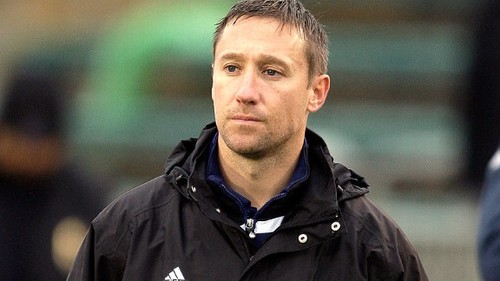
Caleb Porter’s tactics came under fire in the U23 failure
The CONCACAF region will be represented by Mexico and Honduras at the 2012 London Olympics as the qualifiers drew to a close on Monday with Mexico beating Los Catrachos with a late Miguel Ponce strike in the finals.
The glaring omission: The USA. The U23 team coached by Caleb Porter, lost to Canada, 2-0 and in the most crucial of moments gave away a last second goal to El Salvador to crash out of the CONCACAF Olympic qualifiers.
In the aftermath, Porter, the University of Akron coach accepted much of the blame. But Eric Wynalda, on FSC who likes nothing better than to throw conspiratorial, ill thought out bombs blames US Soccer and its honchos for this monumental setback by hiring Porter. He is a NCAA coach with no national experience, blah, blah, blah. Listening to Wynalda it would seem soccer in the USA moved to the medieval ages in a space of a tournament.
This more thoughtful, well written analysis by Matthew Doyle gives a better understanding of where it went wrong for the USA. The talent was there but Porter chose the wrong formation and stubbornly stuck to that bit of dogma even when it went wrong. Now, I don’t profess to follow the U23 team but I know a bit about the 4-3-3 which as everyone knows is used by Barca to deadly effect.
I am also a huge Arsenal follower where the 4-3-3 was used regularly when Arshavin and Nicklas Bendtner were at the club. The similarities between the U23 side and Arsenal, especially in the department of silly defensive lapses were remarkable. Alas’s last gasp goal is exactly the sort of goal Arsenal would give away. The 4-3-3 works beautifully only if you have the defensive discipline and the personnel willing to track back once you lose the ball or who can reclaim the ball quickly. Both Arshavin and Walcott were defensive liabilities in that system. It requires closing down the gaps to stop counterattacks like the one that doomed the USA.
There has to be a recognition on the part of the back line when to go forward and when to fall back and Arsenal for the most part did a lot of back pedaling leaving a lot of inviting space in front of goal to have a go (cf., Newcastle 4 Arsenal 4).
Arsenal have since settled into a 4-2-3-1 formation with Arteta and Song sitting back deep. Since Arshavin’s departure, Walcott and Gervinho have improved following up on the ball. It’s obviously a work still very much in progress (read QPR) but there have been fewer heartbreaking goals.
A more conventional 4-4-2 as Doyle points out would also have helped the US attack with Adu and Shea crossing to Terrence Boyd and another forward to overpower the El Salvadorians who showed vulnerability in the air. It should have never come to Sean Johnson failing to keep out Alas’s goal because even if the USA had won, the 4-3-3 version used by Porter for this group on the pitch would not have guaranteed any future success.
One comment on “Tactical inflexibility cost the US U23 an Olympics spot”
Nice analysis. Thanks.